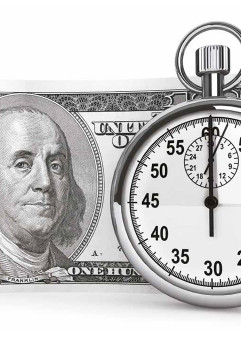Why Time, like Money, Needs to be Managed Efficiently
“Time is money,” is an old English adage, which tells how valuable time is as a resource for the success of any venture. How you manage your time can determine how you will achieve your goals as an individual or organization because good time management makes you more productive.
Success in any venture requires that you understand that time and money are important factors. Like money, time is both valuable and limited. So, how you use it depends on your individual skills learned through self-analysis, planning, evaluation, and self-control.
In his 1748 essay titled “Advice to a Young Tradesman”, American author and politician Benjamin Franklin cautioned, “Remember that credit is money. If a man lets his money lie in my hands after it is due, he gives me the interest, or so much as I can make of it during that time. This amounts to a considerable sum where a man has good and large credit, and makes good use of it...”
In this, Franklin tells his readers about the cost of laziness. Losing time means throwing away the chance of earning. “Remember that money is of a prolific generating nature. Money can beget money, and its offspring can beget more, and so on.”
Management skills
American author and blogger Emilie Burke have argued that managing money and managing time are similar. Once you learn the skill of managing one, you will transfer those skills to managing the other.
“Successfully managing your money requires a budget, one that you can work with weekly and monthly to stay on top of your spending and saving and track your income. Managing your time is similar. Using a calendar or task list to stay on top of what needs to be done and what you’ve accomplished will help you stay productive. Using a budget for your money and calendar for your time will help you successfully manage both,” Burke wrote on money management international’s blogging platform.
“There are only so many hours in the day so you have to use them to the best benefit. Wasting them means you’re not as productive. The same goes for money.
While you do continually replenish your money with new earnings, there is a limit to how much you currently have. Wasting it on things you don’t really need leaves less of it for the things you do,” she further wrote.
Burke’s point is further explained by Dr. Enock Twinoburyo Nyorekwa, a senior economist at the Sustainable Development Goals (SDG) Center for Africa based in Kigali, Rwanda.
One’s expenditure should be within his or her means because excessive consumption can lead to increased debt burden on individuals and governments although this might be of benefit to the private sector.
“Considering the global outlook, there is a substantial reduction in real wages which are wages adjusted for inflation, and this has affected economies,” Twinoburyo told Flashes.
“If nominal wages remain static but inflation rises that means that the real wage has reduced. When that happens, it means that you have to adjust your consumption or you have to draw down on your savings. If not, you will have to increase your debt burden to be able to meet your consumption demands,” he said.
While the debt burden at the household level might be distressing, Twinoburyo argues that sometimes an increased debt burden can be good because it is part of what keeps economies thriving.
His views are also held by Michael Pettis. In a blog post titled “Why U.S Debt Must Continue to Rise”, Pettis said that debt that funds household consumption, nonproductive government activities such as military spending and welfare programs can in some cases have a positive impact on economic welfare.
While this might work for developed economies like the U.S, the case may be different for developing countries like in Africa where household wage data is not available.
Burke in another blog titled “How to Manage Money When Your Income is Lower than Expected” argues that one needs to know the minimum amount of money they need to get through uncertain economic situations.
“There are only so many hours in
the day so you have to use them
to the best benefit. Wasting them
means you’re not as productive.
The same goes for money.”
“Know the minimum amount you need to get by. You may be able to cut back on your grocery spending for a short time, cancel some services and subscriptions you don’t really need, and delay a few payments. But what about those things that need to get paid on time like your mortgage, car payment, insurance, and electric bill. Knowing how much you absolutely need through the month is important,” she wrote.
The use of technology in management
The evolution of technology introduced time saving innovations that make execution of tasks easier, faster, and more efficient. With technology, dealing with cash has become less common. You don’t need to handle cash to make a purchase. But to some economists, the convenience that came with the digital evolution among other benefits need to be tested against the laws of economics.
“Good technology alone does not ensure good economics just as good economics does not ensure good technology. Technology is only effective once it has found its economic purpose. We must consider the intended goals and harness the best and most appropriate technology to help us get there,” argued Agustín Carstens, General Manager of the Bank for International Settlements (BIS) in a speech he delivered in November 2018 at Singapore’s Lee Kuan Yew School of Public Policy.
What policy makers have to do, Carstens argued, is to ensure that technology is applied in a way that is fit for the purpose and, ultimately, helps our societies to develop, to improve and to transform.








